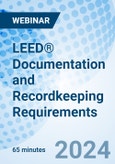Learn about the importance and types of LEED® documentation required for your project.
An important step in achieving LEED® certification for a project is both an understanding of the need for and implementing a plan of recordkeeping and documentation that makes filling out the submittal templates easy to perform. This topic will help you understand not only what recordkeeping and documentation is required, but how to compile it and what needs to be submitted to satisfy LEED® requirements.
Learning Objectives
- You will be able to define the specific requirements within the LEED® Certification process for complying with prerequisites and credits.
- You will be able to recognize the importance of active participation from all parties in the construction process for successful LEED® Certification.
- You will be able to understand the significance of accurate documentation and recordkeeping throughout the certification process.
- You will be able to recognize the types of documentation required for LEED® Certification, such as drawings, photographs, design criteria, project specifications, and manufacturers’ product data.
Agenda
Understanding the LEED® Documentation Process
- LEED® Certification Process Contains Specific Requirements for Complying With Prerequisites and Credits
- Documentation and Recordkeeping Is Key to Success
- Success Requires Active Participation of All Parties to the Construction Process
Importance of Documentation and Recordkeeping in the LEED® Certification Process
- Most Prerequisites and Credits Require Documentation to Demonstrate Achievement of Prerequisites and Credits
- Timely and Accurate Recordkeeping Will Lessen the Burden of Documentation
- Accurate Recordkeeping and Documentation Will Make Responding to Requests for Clarification From Reviewers Easier
- Good Recordkeeping and Documentation Will Result in a Record That Will Make Achieving LEED® Certification on Future Projects Easier
Sources of Documentation
- Documentation Produced by the Design Team
- Documentation Compiled by the Owner
- Documentation Provided by Manufacturers and Contractors
- Documentation Provided by the Commissioning Agent
Types of Documentation Required
- Drawings, Including Building Plans, Elevations, Site Plans, Sections, etc.
- Photographs Taken During Construction and After Completion
- Design Criteria, Energy Studies, Daylighting Studies, etc.
- Project Specifications
- Manufacturers Product Data, Shop Drawings, MSDS, Submittal Letters
Following the Process to Its Conclusion
- The Documentation and Recordkeeping Process Starts During the Design Process
- The Process Continues During the Preparation of Construction Documents and Carries Through the Bidding Phase Into Construction
- Documentation of Certain Prerequisites and Credits Cannot Be Completed Until Construction Is Completed
Speakers

Ross G. Spiegel, FAIA, FCSI, CCS, CCCA, LEED® AP BD+C,
SLAM- Specifications coordinator with the A/E firm The S/L/A/M Collaborative
- Responsible for establishing specification standards for the firm and advising on LEED Certification and sustainability
- Past president of the Construction Specifications Institute
- Vice chair and board member of the Connecticut Green Building Council
- Conducted seminars and webinars on specification practice, green building and LEED® certification
- Can be contacted at 860-368-2394 or rspiegel@slamcoll.com
Who Should Attend
This live webinar is designed for attorneys, engineers, project managers, presidents, vice presidents, architects, contractors, subcontractors, building owners and managers, developers, real estate professionals, government officials, facilities managers, and attorneys.









